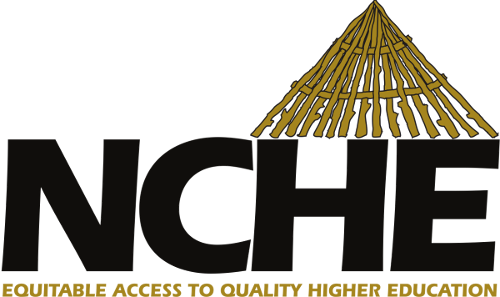The implementation of free primary education in Namibia that started in 2013 has brought a lot of changes in the education landscape that has inevitable implications on higher education. As we prepare to move towards the implementation of similar policy at the secondary education level in 2016, it is important for higher education institutions (HEIs) to be prepared to respond to the anticipated changes in their structures and provisions.
The Higher Education Act (Act No. 26 of 2003) mandates NCHE to ensure a well-coordinated and excellent higher education system through equitable access and quality service delivery. To fulfill this mandate, NCHE in collaboration with other quality assurance and statutory bodies accredits higher education programmes, conducts institutional audit and registers private HEIs. With such a mandate, NCHE acts as the shock absorber of the entire education system including the execution of free education and the recent change in curriculum at the secondary education level. The issue of higher education preparedness to absorb the effects of those changes is critical for NCHE in many respects.
One of the implications of free education and curriculum adjustments is the increase in access to education by the number of secondary school leavers. The access implies more pressure on infrastructure, staff and other facilities including the support services and quality assurance systems. The current situation suggests that more than 3 000 new teachers are needed to fill in the gap due to the increase in the enrolment at the primary and secondary education.
The transformation of the Colleges of Education into Faculty of Education at the University of Namibia (UNAM) came as an additional factor since this brought a gap in the production of new teachers. Consequently, UNAM must develop innovative solutions that protect the quality of its programmes while coping with the pressure brought about by the changes.
In general, HEIs need to step up the production of new teachers and improve on the effectiveness of the existing ones. This task implies and requires NCHE and other quality assurance bodies to get involved and make sure that HEIs have internal quality assurance systems, policies and procedures in place for the quality assurance of their teaching programmes since they are the custodians of the quality of outputs of the Namibian education system. The other effect of free education is the issue of ensuring that while increasing the student enrolment, quality is not compromised in any way. This issue can be approached from two perspectives, namely from the quality of teachers whose capacity has been significantly challenged by the execution of free education and curricular revision on one hand and strengthening of internal quality assurance mechanisms on the other hand to assure quality programmes leading to quality products.
The fewer number of teachers implies the increase in the ratios of teachers to students affecting quality. To this effect, the Government through its Ministry of Education has come up with mitigation strategies of recruiting teachers from Southern Africa Development Community (SADC) region. Similar efforts are being made to ensure that unqualified teachers are retrained or upgraded to meet the required standards, while the higher education institutions are being encouraged to introduce programmes that are intended to increase the number of teachers
In subsequent developments, NCHE as an oversight body of higher education has observed an increase in number of private HEIs operating in the country. NCHE has been following with keen interest the activities and programmes of these institutions and most often reminded them of the legal requirement of programme accreditation, institutional audit, registration of private HEIs and adherence to standards. The benefits of especially programme accreditation are three fold in that it provides to the labour market credible and competent cadres needed in the labour market; cultivate the culture of good practice in higher education; and increase the competitiveness at the international level, as well as the credibility of the institutions that run accredited programmes, in particular.
Given the upsurge of increased enrolment rates due to the trends in expanding free education at all levels of the Namibian education system, NCHE Secretariat acknowledges the inevitable need to support private HEIs and would work with those institutions to institutionalise such support.
Meanwhile, NCHE reiterates its constant reminder to all private higher HEIs not registered and running unaccredited programmes that they are in violation of the Higher Education Act (Act No. 26 of 2003) sections 22 and 25 which oblige private HEIs to register before they offer any higher education programme in the country.
This constitutes also an opportunity for NCHE to call upon those private HEIs that are operating and offering higher education programmes without being registered by the NCHE, to contact the NCHE Secretariat as soon as possible for registration purposes.
Mocks ShivuteExecutive Director

